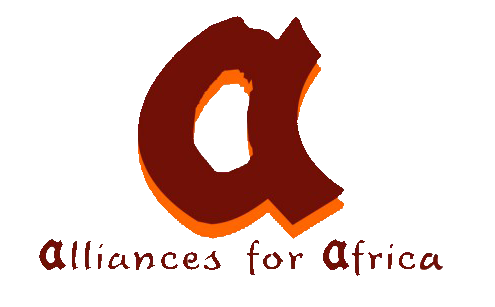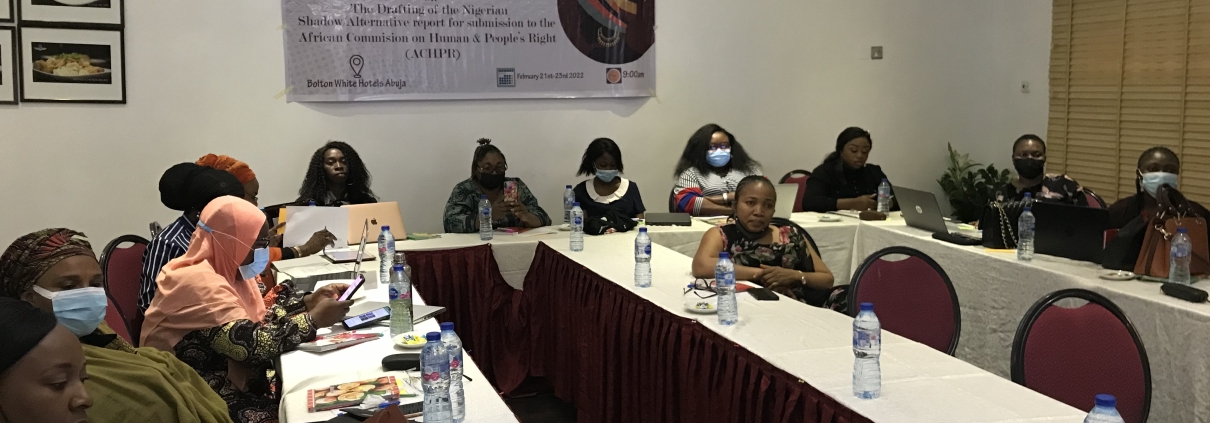Shadow Report on Nigeria’s Implementation of the Protocol to the African Charter on Human and Peoples Right on the Right of Women in Africa
In the first quarter of 2022, AfA coordinated the shadow report project with support from Equality Now and the Solidarity for African Women’s Rights (SOAWR) on implementing the Protocol to the African Charter on Human and Peoples Right on the Right of Women in Africa.
A shadow report is to be submitted for consideration to the African Commission on Human and Peoples Rights (ACHPR), and was prepared by a group of 20 women’s n rights organisations and feminist groups referred to as ‘Platform’. The “Platform” is constituted of CSOs, CBOs, academics, and professional bodies working on women’s rights or whose overall human rights work includes matters relevant to the exercise of women’s rights.
The Shadow report was drafted based on contributions by platform members, and feedback received from the virtual CSO consultation on the implementation of the Maputo Protocol held online on 15 February 2022, responses to surveys and consultation with all platform members.
As part of the project, Alliances for Africa also convened a CSOs workshop on drafting and submitting the Nigeria Shadow Report on the Maputo Protocol with Platform members 21-23 February 2022. A validation meeting on the draft report was held on 23 March 2022.
The Platform lauded Nigeria for being a party to the African Charter on Human and Peoples’ Rights (African Charter) in June 1983 and has been submitting periodic reports to the ACHPR since 1992 when the country sent its initial report. Nigeria ratified the Maputo Protocol on 16 December 2004, but the major challenge is the country’s inability to domesticate the Maputo Protocol in its entirety. However, it has only domesticated aspects of the Maputo Protocol in a few laws, such as the Violence Against Persons Prohibition Act of 2015.
The Platform made recommendations to Nigeria on all aspects of the 21 articles of the Maputo Protocol concerning present-day realities.
Part of the recommendations made was, for the country to:
- Ensure the speedy passage and adoption of the Gender and Equal Opportunities (GEO) bill into law by the National Assembly with resources provided for its effective implementation; and support states to adopt similar laws in their jurisdictions.
- Ensure the constitutional review process addresses long-standing gender equality conflicts to engender the constitution, approve funds for the establishment of Gender Commissions and budget for implementing the law. Passage of gender bills amending the constitution is one step closer to achieving this.
- Provide training for law enforcement agents including state led security bodies like Hisbah, Amotekun, to effectively interpret and enforce gender equality rights
- Harmonise the country’s response to combating SGBV by strengthening the legal framework and consistent application of the law across Nigeria by ensuring that states yet to pass and assent to VAPP do so.
- Government must be committed to ensuring implementation, funding and enforcement of the various laws enacted.
- Capacity building and awareness for security operatives in handling cases of SGBV, including rape, sexual harassment, and harmful practices.
- Strengthen the ministry of justice department of public prosecutions to develop expertise in prosecuting gender-based crimes, including rape and sexual assaults in order to improve justice delivery for victims and their families.
- Address contradictions, recognise and clarify the roles of Federal and Local government marriage registry in the country
- Recognise and create an enabling environment by the law for married women for political participation irrespective of her state of origin.
- Ensure that Child Rights laws and other laws at state level makes it mandatory that persons must be 18 years old and above before they can get married and any unclear provisions in the constitution regarding legal age of marriage are amended in line with international human rights law.
- Enhance capacity building for public and private healthcare service providers by providing comprehensive Sexual and Reproductive Health (SRH) services for all women in their diversity without discrimination.
- Effective implementation of national adolescent health and development policy (2021- 2025) while ensuring that the rights of adolescent girls and young women are upheld and that health services are youth-friendly.
- Update school curriculum to include sex education
- Amend laws to accommodate medical abortion for women in cases of sexual assault, rape, incest, and where the pregnancy endangers the woman.
- Improve access to contraceptives services including education and enhance healthcare service delivery for adolescent girls, young women, women with disability, female sex workers, women who use drugs, lesbians, bisexuals, and queer women.
- Eradicate widowhood practices and harmful practices against older persons, women in distress and womenliving with disabilities through education by the National Orientation agency.
- Publicise progressive judgments that enforce the property rights of widows and pass laws prohibiting cultural practices that disinherit and cause pain and suffering to widows and their children.
- Meet the Abuja Declaration minimum commitment of 15% of national budgets to health.
Ensure substantive representation of women in state-led interventions including fiscal stimulus packages, social assistance packages, security provision and other areas impacting on their socio-economic, political lives and wellbeing.






Leave a Reply
Want to join the discussion?Feel free to contribute!